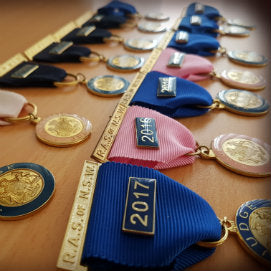HOW THE KENNEDY'S BECAME COFFEE JUDGES

This blog is about our experience with coffee judging. We thought our readers might enjoy an insight into the process of a coffee competition and how the Kennedy family became qualified to judge coffee.
la Casa is a second generation coffee roaster, with the third generation growing up fast. We are a family roasting business with strong family values and long standing customer relationships. Don Kennedy, my dad, along with a handful of other dedicated roasters, helped pioneer a culture of espresso coffee drinking in Sydney and beyond. I don't make this statement lightly - these industry founders have had a profound impact on the development of roasted coffee in Australia and should stand up, be counted and be proud of it.
Our name, la Casa del Caffe, might have lead some to believe we have an Italian heritage, and this somehow qualifies us immediately as coffee producers, so finding an anglo Australian of Irish descent, roasting coffee was rather unusual at the time.
It seemed natural that Don's children would follow suit especially since he had paved a pathway of excellent coffee for us. We didn't enter the industry because of some great desire to change the coffee world - we were born into it. We have spent our life around coffee, and with this comes a highly developed ingrained know how.
Louise, Brett and I, are regular judges at the Sydney Royal Fine Food Show (RAS) coffee competition. We enjoy the catch up with the industry movers and shakers - there are some really fantastic people in coffee! The judges consist mainly of roasters, growers and consumers.
The day starts off with the highly experienced and specifically selected baristas calibrating the espresso machines and grinders whilst the judges mingle and chat about what's new, without giving away too much. Then we're briefed by the event personnel and then we move to our panels and undertake a tasting calibration. This process ensures the panel of judges are aligned, and that the barista is producing consistent examples. Once all that is sorted we're ready to start the judging process. Eighty plus coffees can be judged per day, and to prevent palate fatigue, the RAS supply a lot of water, apple, dry/plain biscuit and dark chocolate.
I should mention, that when judging, one must put their personal taste preferences aside for the competition and be open minded and objective. For instance, I'm not a big fan of light roasts especially when brewed as espresso and milk added (ie latte, cappuccino). I find the sour fruity tastes of the under developed bean over bearing in the milk - I often compare it with adding milk to a glass of pinot gris - you just wouldn't do it!! Although, whilst judging, I must put this aside and work with the other judges to score each coffee based on their individual qualities. However, if a coffee has been entered into the latte category, it is up to the judges to score the coffee based on it's flavours, etc in the milk.
The competition categories include International and Australian grown single origin and blend coffees, across latte, espresso, plunger and decaffeinated. All beans must be roasted in Australia.
The Sydney Royal Fine Food show coffee competition receives hundreds of entries in a number of categories - espresso, plunger, latte, blend, single origin and Australian single origin. The main judging criteria are: aroma, flavour, acidity, body, aftertaste, balance and each panel consists of at least 4 judges.



The barista is key to the judging process. They need to produce a consistent cup for each panel member for each entry otherwise the judging is inconsistent. If one judge scores high and another scores low, then the cups are interchanged between the judges and if a consensus isn't reached, the barista is asked to remake the coffees, one for each judge. Each judge will review their score and in the case where the score remains highly inconsistent, the head judge will be called.
To win gold, a coffee needs to score above 90 out of 100. Not many coffees will reach this score, in fact there have been years when no golds have been awarded at all.
Then once all the coffee judging is complete, we get to taste some of the Fine Foods medal winning wines, beers, cheese, meats, seafood....

